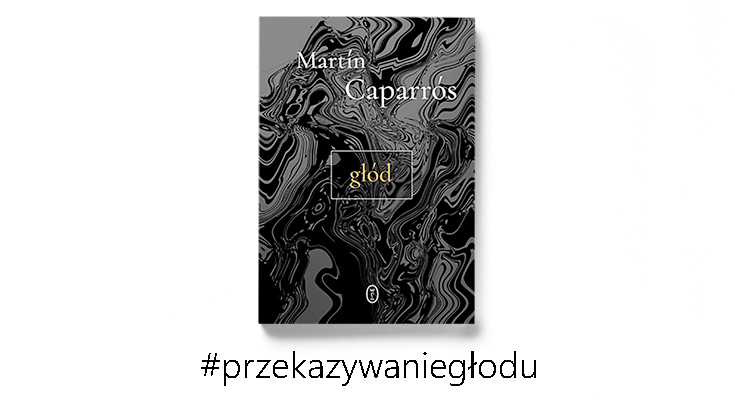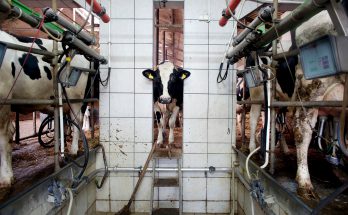
Translation from Polish: Jędrzej Majer
To prepare her dinner, Amena from Bangladesh takes a saucepan in her skinny hand, pours water into it and boils stones with sticks. In this way, she also cheats the hunger of her children in the evenings, who stop crying and fall asleep, soothed by the illusion that they will have something to eat in the morning.
Amena is one of the two billion characters in an Argentinian writer, journalist and traveller, Martin Caparros’ book ‘The Hunger’. On seven hundred tightly written pages they tell the story of their fight against everyday humiliation. Survival is at stake.
Hunger begins in Niger, near Aisha’s shack. Her child just died. Neither a sorcerer, nor God, nor Doctors Without Borders have helped. Her little son died of starvation, and Aisha doesn’t understand why. And she doesn’t know the cure for it. She doesn’t know that the millet flatbread, which is their only food during the day, is far too little for her child to develop properly. And it should be noted that such flatbread does not happen every day. There are days in Niger when you don’t eat anything.
Let’s establish some basic things. People die of hunger in the world. I am writing specifically: they die of hunger because international organizations that fight hunger prefer to talk about the problem of malnutrition or food security. And hunger is hunger.
Hunger does not come from lack of food or poverty, but from poor food distribution. Poverty is one element of the whole phenomenon, but it is not the cause of hunger in the world. We know for sure that there is enough food on our planet to feed all people. It is also a fact that the countries with the greatest poverty are treated as big agricultural fields of the world. Thousands of hectares of land are sold to corporations together with the people who live on it. Colonialism is not dead, it is well and it thrives under many different names: free trade, globalisation.
Caparros asks himself the question “what is hunger” in the book in dozens of ways. Hunger can be seen as a metaphor for inequality, which every day creates tension between those who have something to eat and those who do not. Those who do, accept this state of affairs. Nobody asks those who don’t. Hunger is the impenetrable boundary between observing a phenomenon and experiencing it, because how can you tell a child lying on the ground, whose eyes and mouth are devoured by vermin: what you are feeling is a metaphor of inequality that divides us?
The writer asked himself and his interlocutors from all over the world difficult questions: if you could ask a sorcerer or God for anything you want, what would it be? In response he heard: a cow, some rice, some grain. If someone dared to dream more, Caparros heard: two cows.
We can’t understand why the answer wasn’t: if I could wish for anything, I would want money, health, strength and a good job to feed my family.
Perhaps if we could understand that the hunger his characters are suffering so much from takes away the ability to predict the next days, we would understand that a hungry person cannot think about the future. In the countries Caparros writes about, the future does not exist. As if some mighty Sorcerer or God had decided that the future was unnecessary to his people. There is no food, there is no future.
Let’s take a look at Africa for a moment, the cracked land of Niger. Niger, a country rich in natural resources. This African country is the world’s second largest uranium producer. The French corporation Areva is extracting the uranium and thus making a profit from it. French companies have been extracting Nigerian uranium since the late 1960s. Every time new deposits are discovered, there is a thunderstorm in the Nigerian government. The Chinese and the French fight for the deposits. And there’s famine and drought in Niger. The wealth is consumed, but not by those who are really hungry.
‘Hunger’ is not only a painful diagnosis of one of the most serious global problems. It’s also an extremely interesting literary phenomenon. To write that it is a perfect example of engaged literature of fact would be an understatement. It is a literature that forces us to act, it is a manifesto of rage. Caparros pursues two different poetics in his book. Reportage and internal monologues. Fragments of the inner conversation knock you out of your reading rhythm, they are like a slap in the face after another dose of very strong facts.
Because his book is a gold mine of research results, data and information coming from international organizations established to fight hunger. Caparros did titanic work. He threw himself on an overwhelming topic and executed so profoundly that you’ll have to take breaks during your reading. But you won’t get tired of the language, because it is smooth and captures your imagination. You will become exhausted because of the facts and the growing awareness of what is happening every day on our planet. Kenya, Niger, Bangladesh, Sudan, Madagascar, Argentina, Spain, United States. Yes, the United States. Hunger also reaches to the world capital of consumerism to analyze the morbid obesity of the American society as the next installment of the monstrous machine of hunger.
It is not easy to read this book. It is great, unwieldy, repulsive, and causes fury and madness. But it’s a book that changes something in people. It is one of those items in literature that goes far beyond its usual boundaries. In Hunger, stories are played out that do not go silent after the last page is turned. You will think about them, analyze them, remember them, you will feel the need to change your habits. Perhaps you will start to respect what you eat again. Perhaps you will understand what it means to starve to death.
I met Martin Caparros in Sopot, Poland, it was early summer, at a seaside resort. People around were enjoying the sun and eating ice cream, and we talked about why, while you are reading this interview, almost thirty children will die from hunger, eaten by vermin, after unimaginable torture.
Natalia Soszynska: ‘Hunger’ is a big, heavy and unwieldy book. I read it every day during my work commute on public transport. People often glanced over my shoulder and read with me, they were interested in it. And when someone asked me what the book was about, after hearing the answer, they often replied: it’s not for me, it’s always those hungry children. We have so many of our own problems…
Why do we think that world hunger is not our problem?
Martin Caparros: The very likely reason that almost a billion people in the world are starving is precisely because we’re not ready to see it as a shared problem. People who are hungry are not our friends or colleagues we meet every day, so it’s easy to think – it’s not my business. That is why the greatest shame of humanity – hunger – does not concern us.
I think that it would be a testimony to a higher development of our civilization if we understood that problems that do not concern us directly are our problems as well. That something is not right when there is enough food for everyone on our planet and yet a billion people are starving.
NS: We live in times of great migration. Can the wanderings of ever larger communities be an opportunity for a dialogue about what hasn’t had a name for us so far?
MC: I don’t know if this will help us understand this problem, but the truth is, and it’s quite cynical, that the reason for many of these migrations is precisely the hunger that drives people out of their homes. Often, when the problem of hunger or migration is mentioned in the media, an argument is made that it would be worth resolving this situation at its source. Countries in Asia or Africa are pointed out and ideas are put forward to improve living conditions on the ground. This becomes an argument in the fight against migration. This is a cynical argument. These people will migrate anyway, they will look for their place to live. Hunger is one of the reasons, and everyone wants to have a better life. The world is not owned by states, it is an open house for their citizens. So I don’t think it’s right to solve world hunger out of convenience. We should solve this problem because it is important to us.
NS: Ryszard Kapuściński said that a civilisation that does not ask questions, that casts out the world of anxiety, criticism, exploration, is a civilisation standing still, paralysed. In your book I read that we live in an era without a clear idea of a new paradigm, of the direction we want to take. But can we hope that in the age of searching for answers, with time a revolution will be born?
MC: These opportunities have always been there since our culture began to exist. I studied history, I know that there is no such order in the world that lasts forever. The problem is that such a new project, thought or idea does not materialize overnight, it always takes time, sometimes decades. Something seems to be dawning on the horizon, but it is really difficult to say whether it will take ten or fifty years. Whether it will come at all.
NS: In your book, you cite huge, shocking numbers. Millions of tons of rotting soya, alongside this hundreds of thousands of children who are starving to death. Huge mountains of meat, kilograms of fattened bodies, sick from junk food. And at the same time you can describe the sound of stones in an empty saucepan and the refreshing of old sausages with washing powder. How does one come home after such an experience?
MC: I didn’t have to go back anywhere because I’ve been dealing with this subject for many years and it’s close to me. I didn’t get close to those people to write a book, I wrote a book that was the result of that closeness. For almost thirty years I have been circling this subject. Of course, these scenes evoke emotions in me and I experience them very much, but I have been watching them for many years, and unfortunately this is not new to me. In order to cope, I explain to myself that I’m doing it to tell the story, I can’t do it any other way. I would like people to get to know this reality too so that they can try to change it.
The interview was done in 2017.
 → Natalia Soszyńska – I live and work in Gdańsk. I am a creative copywriter: I write at work and in my free time. I create advertising slogans, names for brands, campaigns. I create, draw and transfer ideas for TV, internet and radio spots. I do interviews, write articles, book reviews, reportages. I am associated with the Sopot Literary Festival. I read a lot. You can find my thoughts about books and some poor quality photos on Instagram @wszystkielitery.
→ Natalia Soszyńska – I live and work in Gdańsk. I am a creative copywriter: I write at work and in my free time. I create advertising slogans, names for brands, campaigns. I create, draw and transfer ideas for TV, internet and radio spots. I do interviews, write articles, book reviews, reportages. I am associated with the Sopot Literary Festival. I read a lot. You can find my thoughts about books and some poor quality photos on Instagram @wszystkielitery.
Illustration: Mateusz Sztajnke.
>>> Interview was taken for: Festiwal Literacki Sopot







